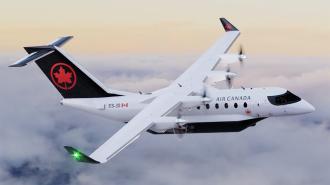Air Canada has announced a purchase agreement of electric-hybrid aircraft from Swedish firm Heart Aerospace, moving electric aviation further towards the runway.
The Montréal-based flag carrier has ordered 30 of Heart’s ES-30 electric-hybrid aircraft, and will also have a $5 million USD equity stake in the company, whose other investors include the Bill Gates-backed Breakthrough Energy Ventures and United Airlines Ventures.
“The introduction into our fleet of the ES-30 electric regional aircraft from Heart Aerospace will be a step forward to our goal of net zero emissions by 2050,” Air Canada president and CEO Michael Rousseau said in the press release.
Held aloft by four lithium-ion battery-powered prop motors — electric aviation has a lovely bit of vintage feel — with turbogenerator reserves, Heart claims the ES-30 will have an all-electric range of around 124 miles, which can be doubled using the hybrid engine and quadrupled if passengers are limited to 25 from its standard 30.
Air Canada has announced a purchase agreement for 30 electric-hybrid aircraft the carrier hopes to have running regional and commuter routes by 2028.
Air Canada’s electric-hybrid aircraft will serve regional and commuter routes in the 30-passenger configuration. According to Heart founder and CEO Anders Forslund, Air Canada is a “strategically important” company because it already runs one of the world’s largest networks of regional turboprops.
In April, the airline powered flights to its four pan-Canadian hubs of Vancouver, Calgary, Toronto, and Montréal using sustainable aviation fuel, Insider reported; it joins major carriers United and American Airlines, as well as a myriad of smaller players, in investing in electric-hybrid and fully electric aviation.
Air Canada’s efforts to go greener in more electricity-friendly short routes is also being reflected in other projects, including regional flights around Hawaii of electric “seagliders” hope to begin operation in 2025 and Spanish airline Air Nostrum’s plans for plying the Iberian skies in airships.
We’d love to hear from you! If you have a comment about this article or if you have a tip for a future Freethink story, please email us at tips@freethink.com.
